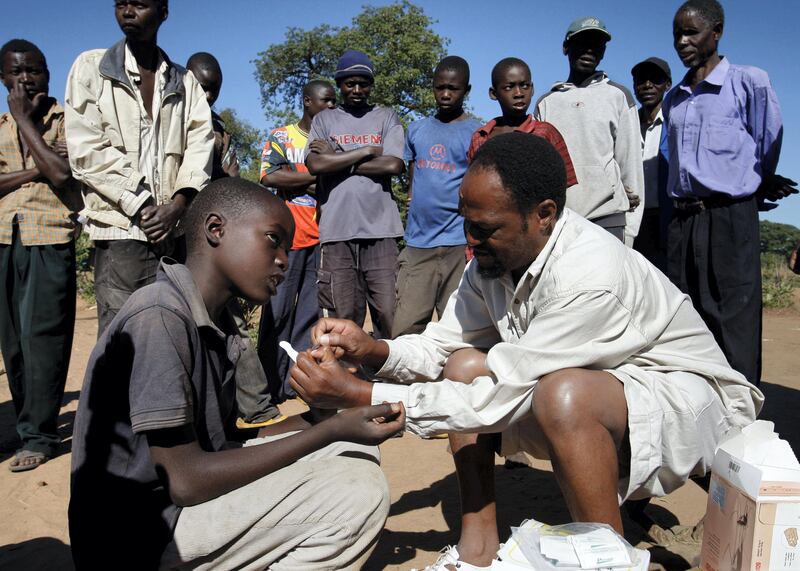Every two minutes, a child dies of malaria, and experts fear the rate could rise without better progress and more funding to tackle a disease that kills millions.
At the Reaching the Last Mile conference in Abu Dhabi on Wednesday, a panel of speakers warned of the disease's spread and its resistance to some of the main drugs used to treat it.
Malaria is a life-threatening disease caused by parasites that are transmitted through the bites of infected female Anopheles mosquitoes.
According to the World Health Organisation, in 2015, 91 countries and areas had ongoing malaria transmission and there were about 212 million cases and 430,000 deaths, the World Health Organisation estimated. Ninety per cent of cases and deaths were in Sub-Saharan Africa that year.
______________
Read more:
[ Reaching the Last Mile: summit to eradicate world diseases opens in Abu Dhabi ]
______________
“The malaria parasite is quickly developing resistance, which highlights the continued need of research and development. Innovations are crucial," said Austin Burt, professor of Evolutionary Genetics and Imperial College and Principal investigator of Target Malaria.
"Millions of lives have been saved but more tools and innovation needed. The key features we are looking for are innovations that will reduce transmission and inexpensive and feasible to deploy."
Increased prevention and control measures has led to a 29 per cent reduction in malaria mortality rates globally since 2010.
But earlier this year scientists warned of the rapid spread of 'super malaria' in South East Asia. The Mahidol-Oxford Tropical Medicine Research Unit in Bangkok warned there was a danger the disease would become untreatable.
The first choice treatment for malaria is artemisinin in combination with piperaquine, but the parasite has evolved to resist both and in Vietnam the drug failed a third of the time. In Cambodia it was closer to 60 per cent of the time.
"We need to eliminate Malaria in at least 35 countries and are calling for a doubling for our funding and services which will allows us to reduce malaria," said Dr Pedro Alonso, the WHO's director of the global malaria programme.
Funding has stalled both an an international and regional level, he said.
“And that translates into the lack of progress we have seen in the past years.
"We are off track, we can get back on track, but we need support from international countries. I’m always horrified to see that 30 per cent of cases get treated. There is still 70 per cent who are not. We could do a lot better."
Since 2011, Sheikh Mohammed bin Zayed has donated $30 million towards eradicating malaria.
“Twice we eliminated but we couldn’t sustain it. We had a bad experience. It is difficult to control,” said Sri Lanka's minister of health Dr Rajitha Harischandra Senaratne.
He cited reasons for that like travel and a need for more awareness
“We need a continuous campaigns and surveillance,” he said.
Dr Matshidiso Moeti, WHO regional director for Africa, said that the UAE had made tremendous contributions through the Roll Back Malaria Partnership. Dr Maha Barakat, Advisor to the Executive Office, Abu Dhabi Government, is a Roll Back Malaria Partnership Board Member.
“Efforts to fight malaria have started to slow down and our concern is that it is reversing. The resources need to scale up,” Dr Moeti said.
“There is funding coming from outside and the global fund but we want this to a high political priority for the national authority.
"We want the presidents of countries where malaria is an endemic to talk about malaria when they talk to the wold fund about development – not just about road and infrastructure. Those are important but when you have a large number of people sick with malaria that is bad for your economy; dying of malaria, that is even worse for your economies.”
The UAE she said could do several things – “mobilise leadership at a global level, in terms of the global decisions, so that the leaders of endemic countries allocate money themselves.
"I would like to see a president, ask his minister, 'why is this going on now'? 'What is going on'?
"'What problems are you having? What are the issues in terms of resources or accountability? I think people like the Crown Prince [of Abu Dhabi] can remind that world leaders that this is a priority, do something about it... and keep this on the international and global health agenda."






